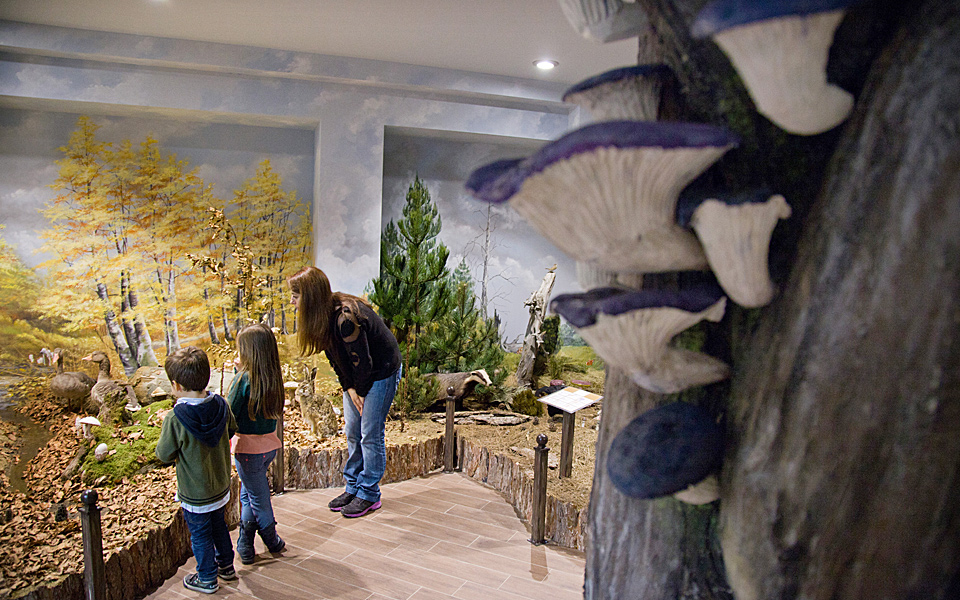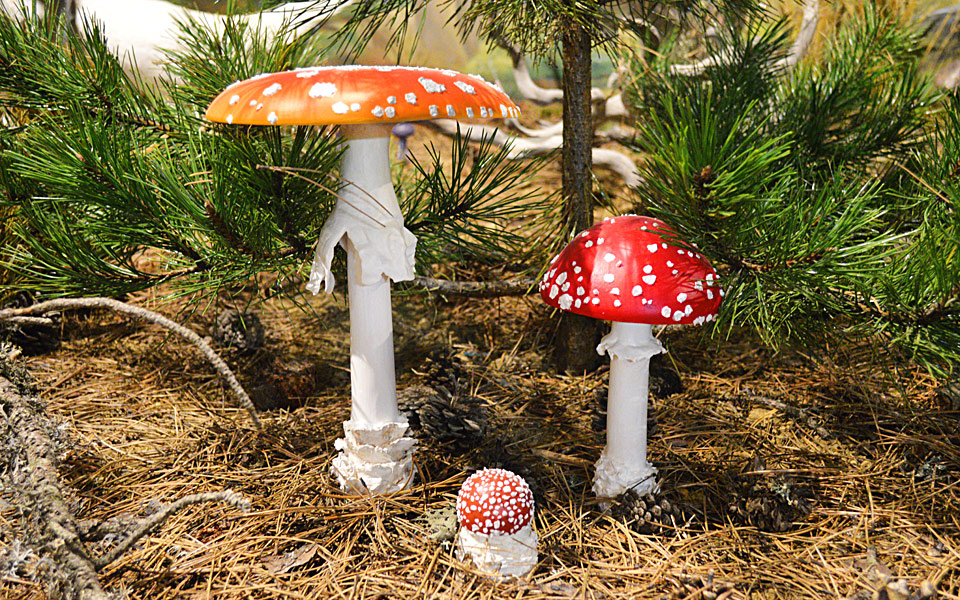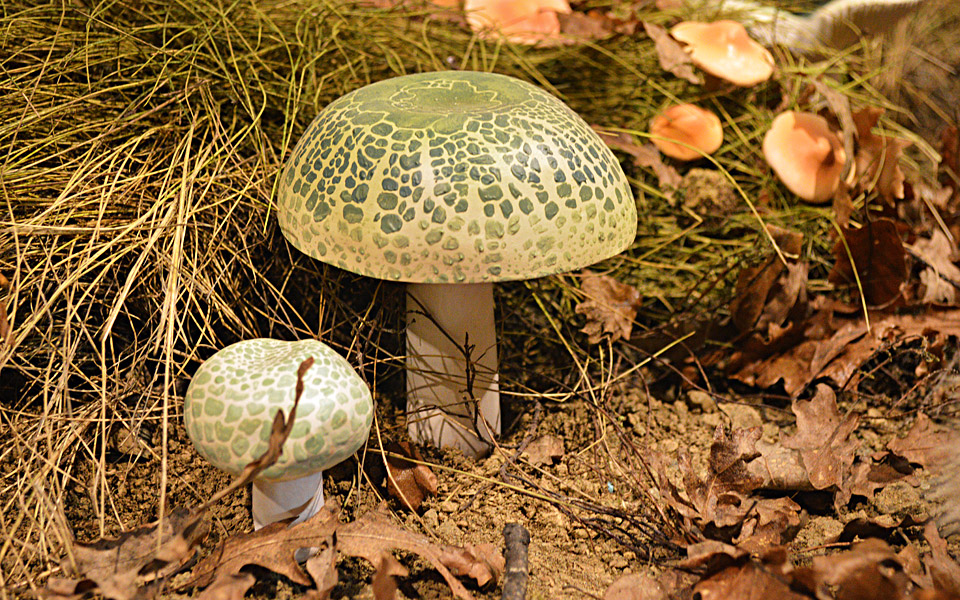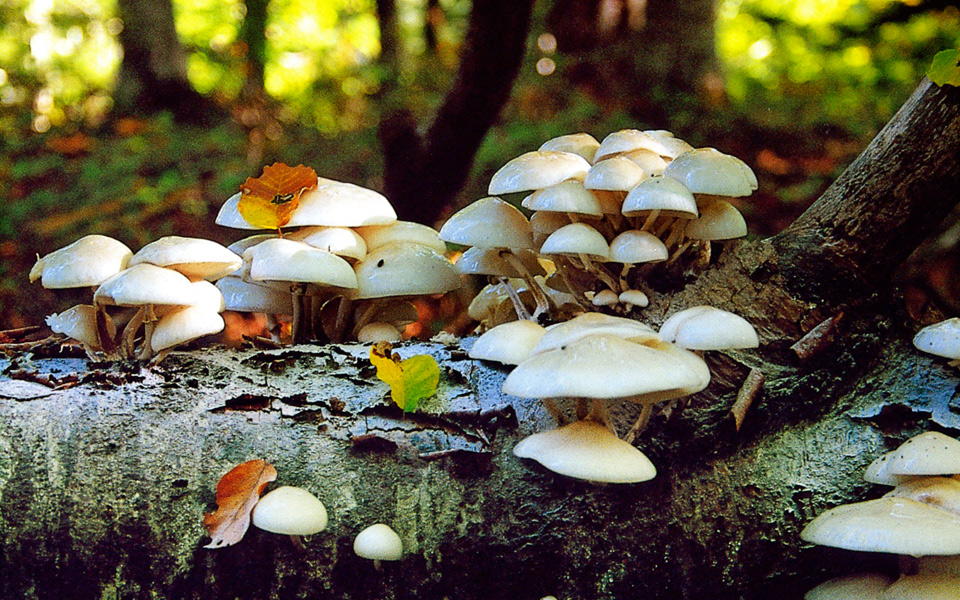As the car convoys reached the woods, hundreds of people armed with baskets were divided into groups led by expert mushroom collectors. Soon, the hunt was on and samples of mushrooms, both edible and toxic, started piling up. The mushrooms were then identified and categorized with labels providing information for each type.
These were some of the activities comprising the first edition of the Mushroom Festival in Kalambaka, Thessaly, central Greece. The event was organized in early October by the National History Museum of Meteora & Mushroom Museum with the support of the Regional Authority of Thessaly, the Kalambaka Municipality and the Mushroom Friends of Greece, Epirus and Western Macedonia.
“We welcomed 5,000 visitors and served 8,000 free mushroom dishes. The place was packed. Kalambaka hotels reached 100 percent capacity; the same was true in Trikala. Visitors also found accommodation in the nearby mountain villages. People came from Thrace, the Cyclades and Crete,” said museum director Nikos Pallas. “Our guests also included mushroom lovers as well as academics from abroad. All the tourists had an amazing experience.”
Mushroom picking and tasting sessions were complemented by a series of cultural events, including an exhibition of mushroom art, a theater production, a concert and an evening featuring traditional local dances.
“We had Japanese, Chinese, American and Greek visitors dancing and tasting mushrooms until 2.30 in the morning. They tried 20 different mushroom flavors ranging from truffle and mushroom pasta to mushroom souvlaki, mushroom schnitzel, mushroom risotto and mushroom soup, among others. The festival is now an institution and, more importantly, we got people out in the woods,” he added.
The Meteora event was not the first of its kind to be organized in Greece.

© National History Museum of Meteora & Mushroom Museum
“Thirteen years ago, we organized the first mushroom festival on the banks of the Venetikos River in Grevena. This was followed by other events, held on a local and regional level across the country, from Kastoria in northern Greece to Kalyvia in eastern Attica. So far, I’ve counted 143 seminars on the subject,” said Giorgos Konstantinidis, who instigated the Grevena event. A teacher, Konstantinidis is also the president of the Greek association of mushroom lovers and the author of six books on the subject. Twelve years ago the Athens Academy awarded him for his contribution in the field.
“Leading European experts now agree that although Greece was a late starter in terms of recording, researching and cultivating mushrooms, our multifaceted approach early on means that today, 16 years after the establishment of the first association of mushroom lovers and the development of eight associations in total, everyone is talking about the ‘modern-day Greek mushroom-loving miracle.’ This is happening despite the fact that up until recently Greeks, Albanians and Britons were considered to be the most mycophobic people in Europe.”
The country’s microclimates guarantee mushroom biodiversity. With about 3,000 to 3,500 types of mushrooms having been recorded so far – this is about half the number of estimated varieties across Greece – experts believe that the country will soon be considered to be if not the richest in terms of mushroom variety – Italy is currently the European leader – at least among the richest.
A natural product capable of generating economic growth, mushrooms can be processed, packaged and sold.

© National History Museum of Meteora & Mushroom Museum
“It is no coincidence that companies related to the local mushroom industry are growing in number. What’s more, higher demand has also resulted in hundreds of collectors, a number of whom are earning quite a respectable income,” said Konstantinidis.
The lack of certified mushroom collectors is one of the challenges the local industry faces, according to Konstantinidis. Although certification exists on a European level, there is no legislative framework for mushroom collection in Greece, Portugal and Cyprus.
“We are in touch with the Ministry for Agricultural Development following a proposal we submitted and we are hopeful that a solution will be found soon,” noted Konstantinidis. “This is important not only for all the mushroom lovers out there, but for the further development of a very promising sector.”

© National History Museum of Meteora & Mushroom Museum
EIGHT NEW TYPES, WORLDWIDE
Over the last two years, a Greek mushroom-loving research team, in association with mushroom aficionados across Europe, has been focusing on two of the hundreds of very hard to trace underground mushrooms. According to Konstantinidis, the team recorded eight new types previously unknown anywhere else in the world, including new species of the Gautieria and the truffle Barssia (Helvellaceae). “They are tremendously valuable,” he said.
It is said that Greek mushrooms have always enjoyed an impeccable reputation. Is there scientific proof to back this claim?
“Nine years ago the chemistry department at the University of Ioannina asked me to provide samples of 50 types of mushrooms found in Northern Pindos, western Greece. I collected mushrooms in Grevena and the regions of Kastoria, Kozani, Florina, Trikala and Ioannina. The results were interesting and impressive. The lab analysis unearthed various aromatic elements, such as those found in cloves, cinnamon, mint, even African ginger. One type alone had 99 aromatic elements. A second round of testing carried out later to examine the nutrient content of Greek mushrooms on the one hand, as well as the existence of harmful heavy metals on the other, was of even greater importance,” he said.
The testing, says Konstantinidis, showed a high level of fortifying elements and a low concentration of heavy metals – with the latter well below the maximum safety levels set by the World Health Organization.
“The Germans felt we were idealizing our mushrooms and asked me to provide a second series of samples of the exact same types of mushrooms collected in the exact same areas. So I did. The results were like a carbon copy of the initial research. It was proven in the laboratory as well that Greek mushrooms are the world’s best.”










